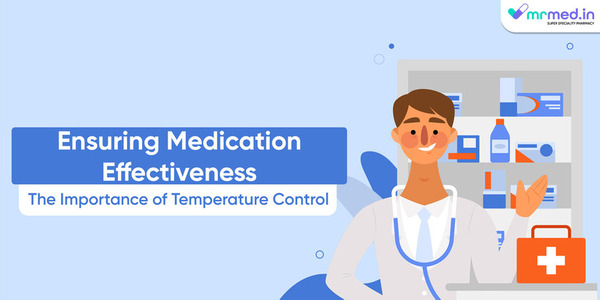The efficacy of pharmaceuticals is a critical aspect of health care, with proper storage and management playing a pivotal role. One key factor often underestimated in its importance is the control of storage temperatures. This aspect is particularly important when dealing with specialized treatments available through online or super specialty pharmacies, such as those required for cancer therapy. This detailed article delves into the reasons why maintaining precise temperature is vital for the potency of medications, offering practical advice for both patients and healthcare providers to safeguard drug efficacy.
How does temperature affect medication?
Medications are developed under stringent conditions, with precise formulations that can be sensitive to environmental changes. Temperature variations, in particular, can affect a drug's chemical stability, potentially decreasing its effectiveness or leading to safety concerns. For instance, medications used in cancer treatment, may include sensitive compounds, which could become less effective or even harmful if not stored correctly.
Biologic drugs, often used in carcinoma treatment, are especially vulnerable to temperature changes. These therapies are produced from living organisms and require careful temperature management to preserve their therapeutic properties.
What are the storage conditions for medicines?
Regulatory bodies like the Central Drugs Standard Control Organization (CDSCO) are pivotal in maintaining the safety and efficacy of medications. They issue specific guidelines for storing medications, which are typically listed on the medication’s packaging or within the accompanying patient information.
Most medications should be stored at room temperature, approximately 59°F to 77°F (15°C to 25°C), although this range may differ for certain products. Some medications require refrigeration, maintaining temperatures from 36°F to 46°F (2°C to 8°C), and must never be frozen, as freezing can irreparably damage the drug.
This is especially true for critical care medications, such as those used in cancer treatment. Improper storage of these drugs can result in diminished potency, decreased effectiveness, or even pose risks to the patient, highlighting the essential role of temperature management in preserving the integrity of these medications from production through to delivery.
Temperature-controlled medication storage
1. Appropriate Storage Solutions: Medications should be stored according to manufacturer guidelines in a stable environment. Avoid places with high-temperature fluctuations, such as near windows, heating appliances, or inside cars.
2. Specialized Packaging for Shipments: When ordering sensitive medications like cancer treatment capsules online, check that they are shipped in packaging designed to maintain the required temperatures. Many pharmacies now use thermal insulated packaging with cooling elements to stabilize temperatures during shipping.
3. Continuous Temperature Monitoring: For long-term storage at home, especially for large quantities of medication, it can be wise to invest in a temperature monitoring device. These devices can provide alerts if the storage temperature moves out of the safe range, allowing you to take immediate action to protect the integrity of your medications. This active management of storage conditions can significantly improve the efficacy and safety of your medications.
4. Prompt Handling Post-Delivery: Immediately after receiving the medicine deliveries, move them to their proper storage conditions. Avoid leaving medication packages exposed to extreme outdoor conditions or inside mailboxes for prolonged periods.
5. Professional Guidance from Pharmacists: It's crucial to consult with the pharmacists at your online pharmacy for expert advice on proper medication handling and storage. They can provide the best recommendations based on your local climate and seasonal variations, ensuring you have the necessary knowledge and support to maintain the effectiveness of your medications.
The rise of online and super-speciality pharmacies
Online and super specialty pharmacies have revolutionized access to critical medications, including those for severe health conditions like cancer. These entities are equipped with advanced systems and stringent quality controls to ensure the safe distribution and storage of temperature-sensitive medications, providing patients with peace of mind about the integrity of their treatments:
- Advanced Distribution Networks: Such pharmacies often partner with specialized logistics providers that prioritize temperature control during the transport of pharmaceuticals.
- Stringent Quality Controls: Reliable online pharmacies adhere to strict quality assurance protocols, including maintaining proper temperature throughout storage and transit. This commitment is crucial for treatments targeting critical illnesses.
- Educational Initiatives for Patients: These pharmacies are also instrumental in educating patients about the importance of temperature control offering resources and support to ensure medications are stored correctly, thereby preserving their effectiveness.
Additional measures for temperature-sensitive medications
- Labeling: Look for temperature indicators on medication packaging. These indicators can change color if the product is exposed to variations outside the recommended range. This feature provides an immediate visual cue about potential exposure to inappropriate conditions.
- Emergency Preparedness: In areas prone to power outages or extreme weather, have a plan for maintaining medication temperatures. This might include having backup power for refrigeration or storing ice packs to use in emergencies.
Proper storage, including temperature control, is critical for pharmaceutical effectiveness. This is especially true for medications, such as those used in cancer treatments. By understanding and implementing the necessary temperature control measures, patients and healthcare providers can significantly improve the efficacy of these vital medications. As healthcare continues to evolve, maintaining stringent control over medication storage conditions will remain essential.




